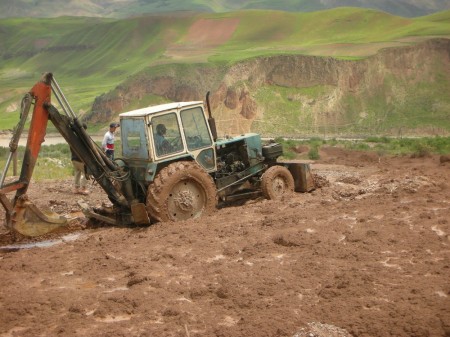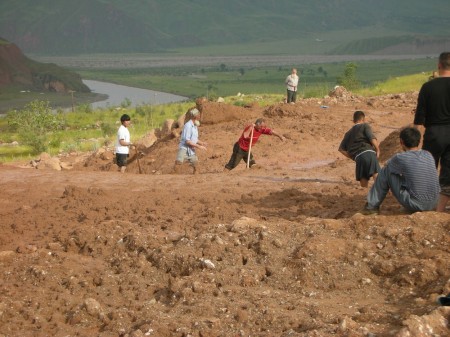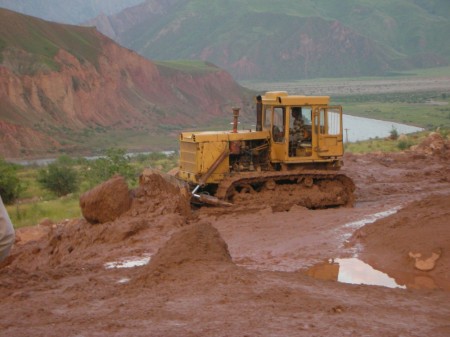The next morning, before breakfast, I discovered not one but two dead scorpions in the bathtub, where Farahnush had apparently crushed one herself before I had awoke. I speculate they were living in the small gaps around the ceiling, but much later, after reading up on the toxicity of scorpions of Central Asia, I have to admit that they probably weren’t that dangerous, and probably would have given the equivalent of a bad bee sting. I was feeling much better; positively rejuvenated in fact after the adventure of the previous night. Therefore, I was all for forgoing the БДА’s warning that the road north along the Mountain Highway was closed because of Islamic militants that had moved in a few days ago and were occupying the region – militants? No problem! However, I was obviously outvoted by clearer heads, and we continued along the Khorog-Kulob road that we had taken several days before, enjoying the same huge waterfall and scenery from a different direction.
Everything seemed to be going fine until just as we were leaving the mountains behind and turning away from the Panj at last, around 11:30 in the morning. We came across a line of cars, then trucks, and finally were forced to grind to a halt as we surveyed a vast sea of mud covering and blocking the road that certainly hadn’t been there before. On the other side, we could see a similar line of vehicles stretching back and along the road we had been hoping to take, their drivers sitting restlessly on the rocks around the road. One man was trying to cross the mud as we watched; it came almost up to his waist, an ugly brown paste that seemed like it might drag him down and under at any second. There was no way that any one of these vehicles, even our trusty Niva, was going to make it across that morass.
Saeed and Malik consulted with some of the other assembled men on our side of the mudslide about what to do. Many had been waiting all morning already, but they had heard that the local government was sending out some tractors to come and push the mud off the road. No one seemed angry or upset about their blocked progress – mostly just bored. I realized that many of them make this trek several times a year, if not more, and roadblocks like this become common in the spring and summer as the mountains shed their winter snow coats into the streams, rivers, and roads below. I settled down to wait in the tall grass by the side of the road as Malik and Saeed began tinkering with the Niva. It seems that after five days of beating it with boulders it was finally showing some signs of stress – a slight grinding noise from the right front wheel, or a ticking noise from the left. Upon seeing people working on a car, other men left their cars and families and drifted over, bringing extra carjacks, advice, and other tools. Meanwhile, Farahnush sat higher up on the hill with some of the Pamiri women in our little convoy and conversed with them, although their accent was so different that dialogue between them was limited. She learned though, that they were from the Darvoz region we had just passed through, and that they become friends with Afghani women that lived on the other side of the river, communicating with each other like pen pals. It’s very different than the borders we’re accustomed to in America, and sad to think that because of the laws (and landmines) imposed on that border, they will never get to actually meet their friends that they can see, only 30 meters away.
We didn’t have to wait long before our cavalry arrived – an old, tired-looking blue and white tractor with a front-end loader attachment chugged up the road a half hour later, driven by a middle-aged man in a polo shirt. He told us that another tractor was on its way “in just a few minutes,” and immediately set to work on the mud. He used his front scoop to push it around, somewhat ineffectually, and nearly got himself stuck several times as a meter of thick goop slid over his small front tires and threatened to roll him right off the road. Meanwhile, Farahnush and I stood with the men, who were by this point smoking, chatting like old friends, or smoking. Farther up the newly-created stream, some people were carrying their possessions, slogging through the mud in their boxers with their pants carried over their heads to keep them clean.
After an hour of work, the poor tractor had barely moved the mud and we were forced to admit that we’d need something larger to do the trick. Malik and Saeed, having done all they could for the bent front axle here in the wilderness, drove our group into a nearby village back the way we came. We were invited in for lunch by a sympathetic man and his family, who served us heaping bowls of traditional soup with bread and listened intently as Malik described the problem and situation to him, waving off any money offered to him with a firm smile. By the time we made it back out to the road, it was almost 5 in the afternoon, and now a few people had gotten the initiative to start using shovels and try to dig the road free under their own power. Even an old sheikh, his white beard shining with sweat and pale legs covered with mud to the thigh, was working with a couple younger men as the crowd around the road grew ever larger with people.
I couldn’t stand the sight of that old man working that way while I was sitting on the sidelines doing nothing. I started to remove my wristwatch and shoes with preparation to join them, and Farahnush translated for me to a group of bystanders my hope that at least 20 or 30 of us could work together and at least have the road partially freed by the time night fell. My wish was met with skepticism; this was not the time for idealism, not when a tractor was on its way. “But there was a tractor coming here 6 hours ago and it still hasn’t arrived!” I retorted. “If I let you go out there and dig mud, my mom is going to kill me – this is supposed to be your restful vacation!” Farah told me. At this, Malik told me he was going back to the village to go look for a local tractor who would help us – for a price. I remembered, though, that the government was supposed to be paying to send out local tractors to blocked roads – shouldn’t they be paying for this? My questions were met by the group with knowing, cynical smiles.
Within another hour, the road rumbled with the sound of an approaching bulldozer, a huge tank-like machine with treads that was easily twice the size of our previous tractor. Upon the driver’s arrival, his first order of business was collecting gasoline for his bulldozer and his fee – 10 somoni per vehicle waiting for a total of about 650 somoni. He had brought a friend with him who moved in among the cars, collecting the bills and change from the families and truck drivers. As I stood nearby, a thin man sauntered up to Farahnush, eyed me up and down, and murmured something to her. Her eyes grew wide and she quickly led me away from the area, explaining that if the driver saw me, and recognized me as an American, he’d raise the price for everything if he thought he could get away with it. No one seemed surprised by that thought, and Malik agreed that there was a good chance he’d do that. As the bulldozer easily cut through sun-dried mud, I watched from a distance, behind everyone else in an attempt to remove even the possibility of becoming a problem. A man with one leg supported himself with crutches and observed the proceedings nearby, and asked Farahnush if things like this happened in America, to which she replied that natural disasters like floods and mudslides happen everywhere, but in America they probably would have responded to it faster than 7 hours. I mentally corrected her – the Tajiki government, the “they” in question, still hadn’t responded to it. The border guards and БДА police crouched uselessly nearby. They had watched the elderly Tajiki man struggling in the mud without even lifting a finger in his support. And now everyone was forced to pay out-of-pocket for this bulldozer, since the government had never sent one. If Malik hadn’t been lucky enough to find one willing to drive out, who knows how long this convoy would have waited.
Suddenly people realized that their 7 hour imposition was about to be removed and the other side of the river was emptied of people, doors slamming as they climbed back into the cars. The bulldozer was almost finished with a small path when the first car, a white Niva like our own from the other side, daringly raced over the mud without waiting for an “all clear” sign. With a loud squishing noise, he promptly got himself stuck in the muck next to the tractor, raising a low, schadenfreudic chuckle from the crowd. “And the first shall be last,” I quipped, while Farahnush and Malik agreed that because of the driver’s impatience, no one was going to go out of their way to help him unstick his truck. A few minutes later, the other side started to proceed through the narrow gap in the mud, and people from our side shouted angrily at them – why were they going first? Personally, I agreed that the other side should go first…it was almost dark now, which meant that they’d be traversing the steep, landmine-covered slopes over the river with nothing but headlights and they’d have no place to stop and rest until Qal’ai Khumb, four hours down the road. Our side, on the other hand, would be out of the mountains soon and on our way to Kulob. Just my opinion on things.
The dull blue glow of the afternoon was just disappearing over the mountain as our Niva pulled through the gap, one of the leaders of our side of the river due to our early arrival. The bulldozer driver and his friend stooped on the bank, watching the proceedings with satisfaction. I wondered how often they had been found by desperate drivers, and commented that next time, the government should hire them for their bulldozer instead of the broken down little tractor. I thought it would be an easy ride from here, but apparently we weren’t “out of the mountains” yet – the road was closed up ahead, probably due to more mudslide damage, causing us to detour down the cliff towards the river towards a small town, which I saw only briefly before the darkness swept over the valley. On the edge of the village our convoy came across a pack of young women, probably between the ages of 14-18, standing on the sides of the dirt road. They were laughing, holding up vegetables and juice, and enjoying the proceedings like it was a party. To my surprise, they chorused to us, in English, “Buy something!”
Within 15 minutes I found myself wishing they had been selling antacids, because we had entered The Alluvial Plain From Hell, a ridiculous stretch of boulders the size of basketballs, no discernible path, and the bumpiest ride we had yet experienced. In the darkness, our line of vehicles, 40-long, searched blindly for some way to find the backroad that would connect us with the highway again, almost getting completely lost several times. I found myself literally praying for the car’s survival as we banged over the rocks, hearing the poor Niva groan as we pushed its offroad ability to ridiculous limits. I knew that if we broke down here it would be almost as bad as if we were still in that mountain pass. But at long last our headlights finally shown against a dusty road rising back up again to connect to the main road.
The Niva continued to get worse, making more and more horrifying noises as we lurched out of the mountains and back onto a paved road. Finally it got to the point where Malik didn’t want to risk his daughter and adopted son, so he called another one of his friends in Kulob and found a place for us to stay. Khudo ba shukur – Tajiki for “thanks to God” – for Malik’s numerous friends! It’s amazing the hospitality of the Tajiks – the bearded young sheikh that invited us into his home three hours later at midnight had mattresses, dinner, tea, and a place all prepared for us like we had made reservations a week in advance.





No one has commented on this post - please leave me one, I love getting feedback!
Follow this post's comments, or leave a Trackback from your site